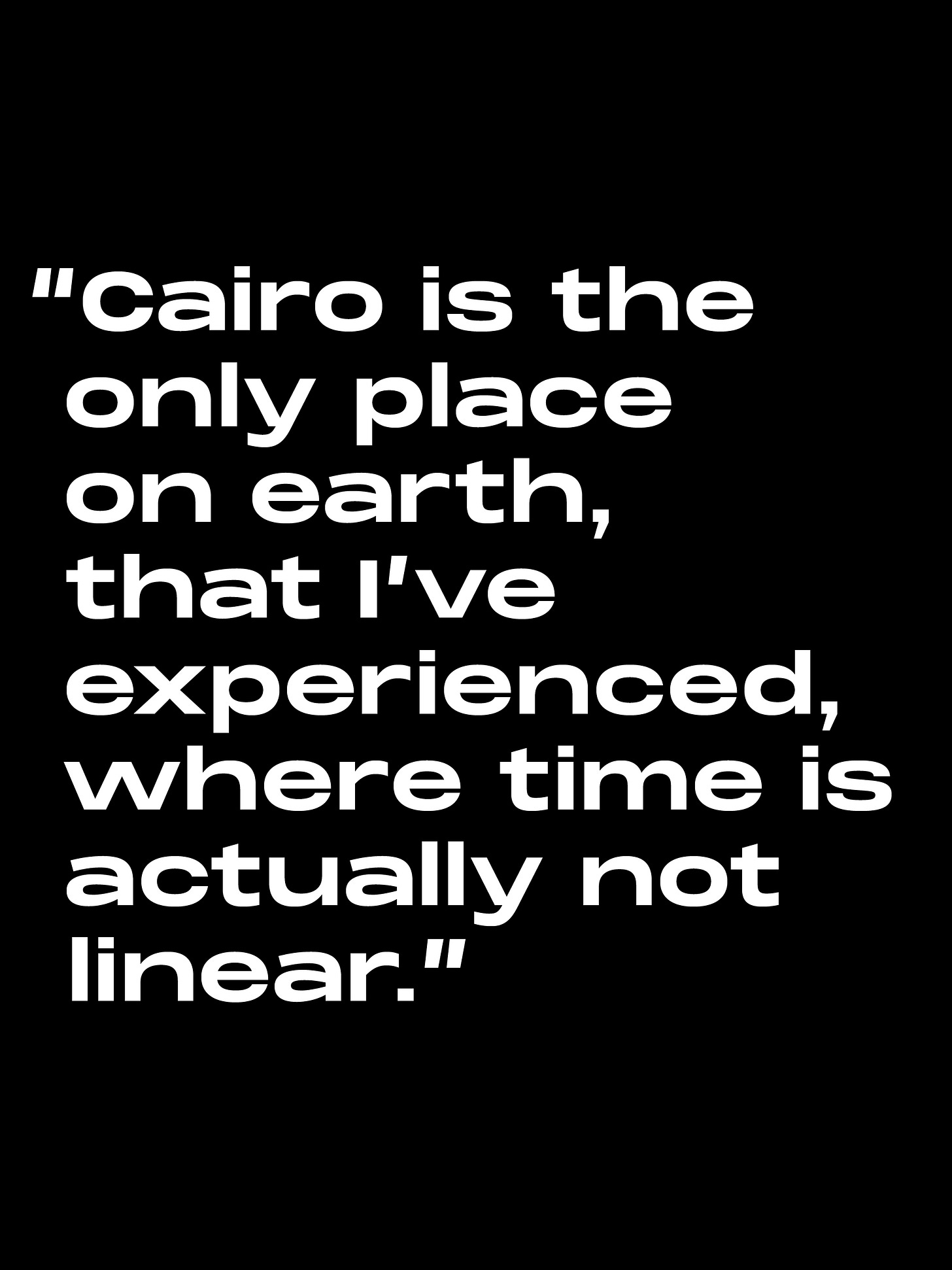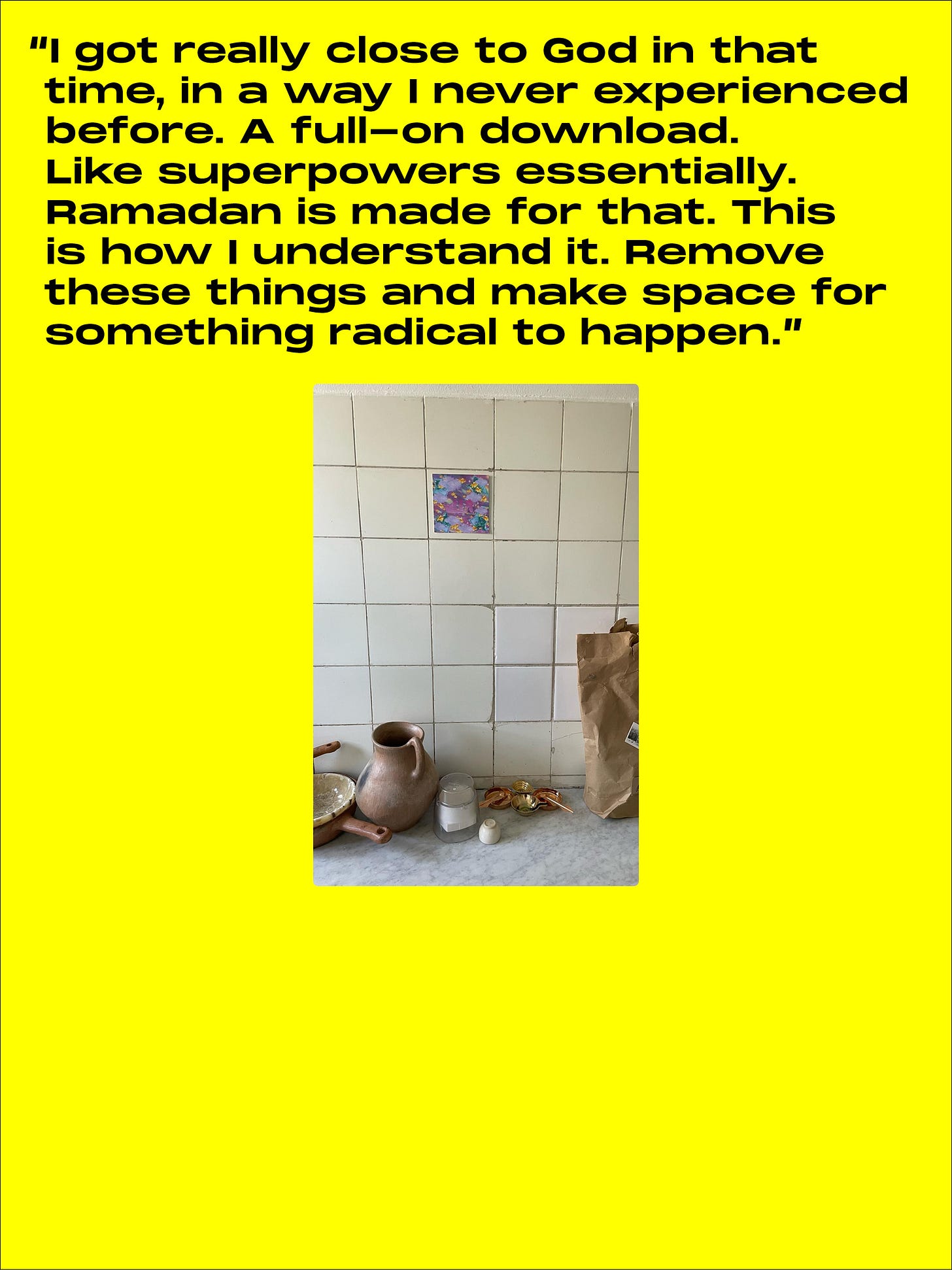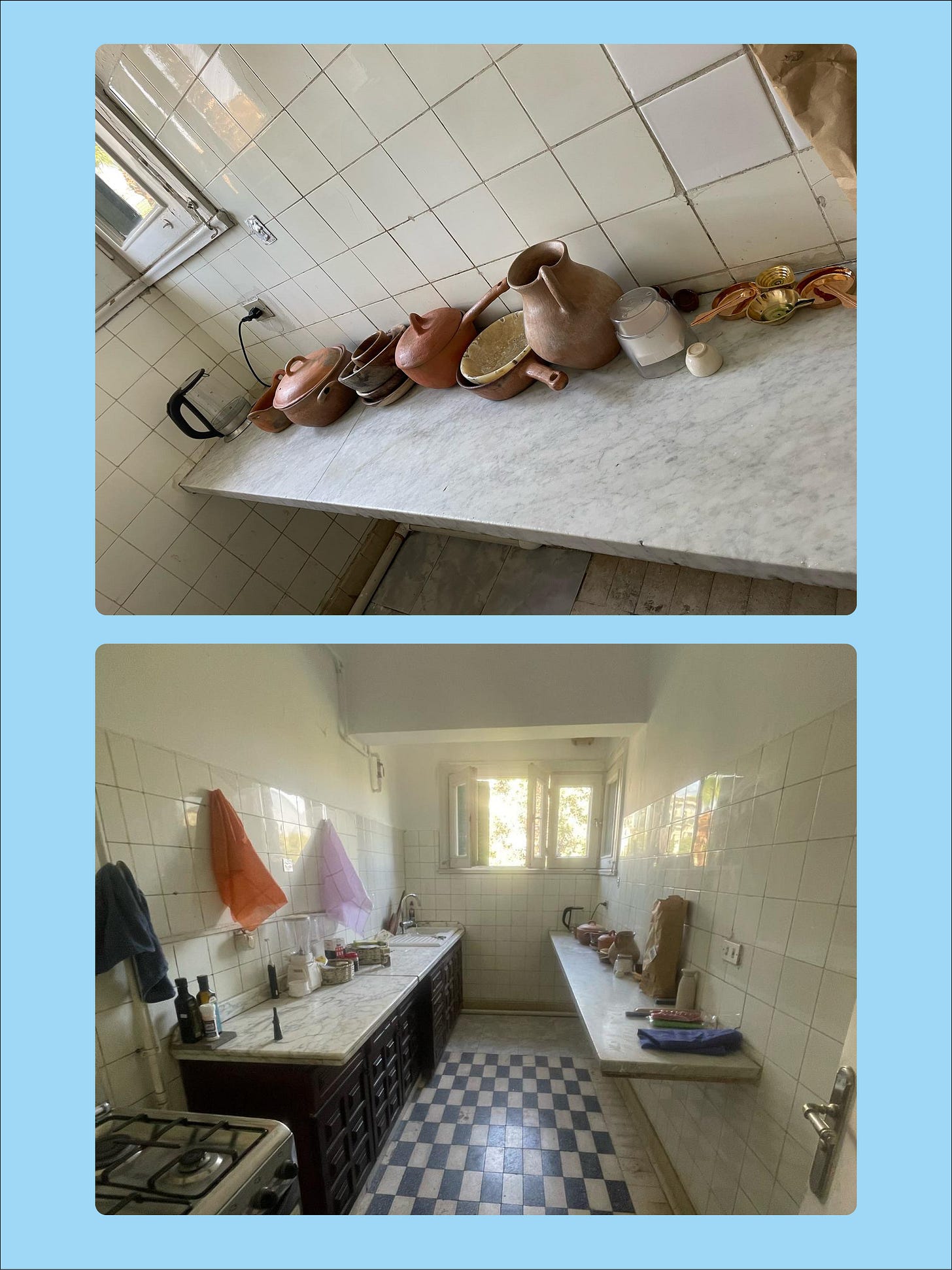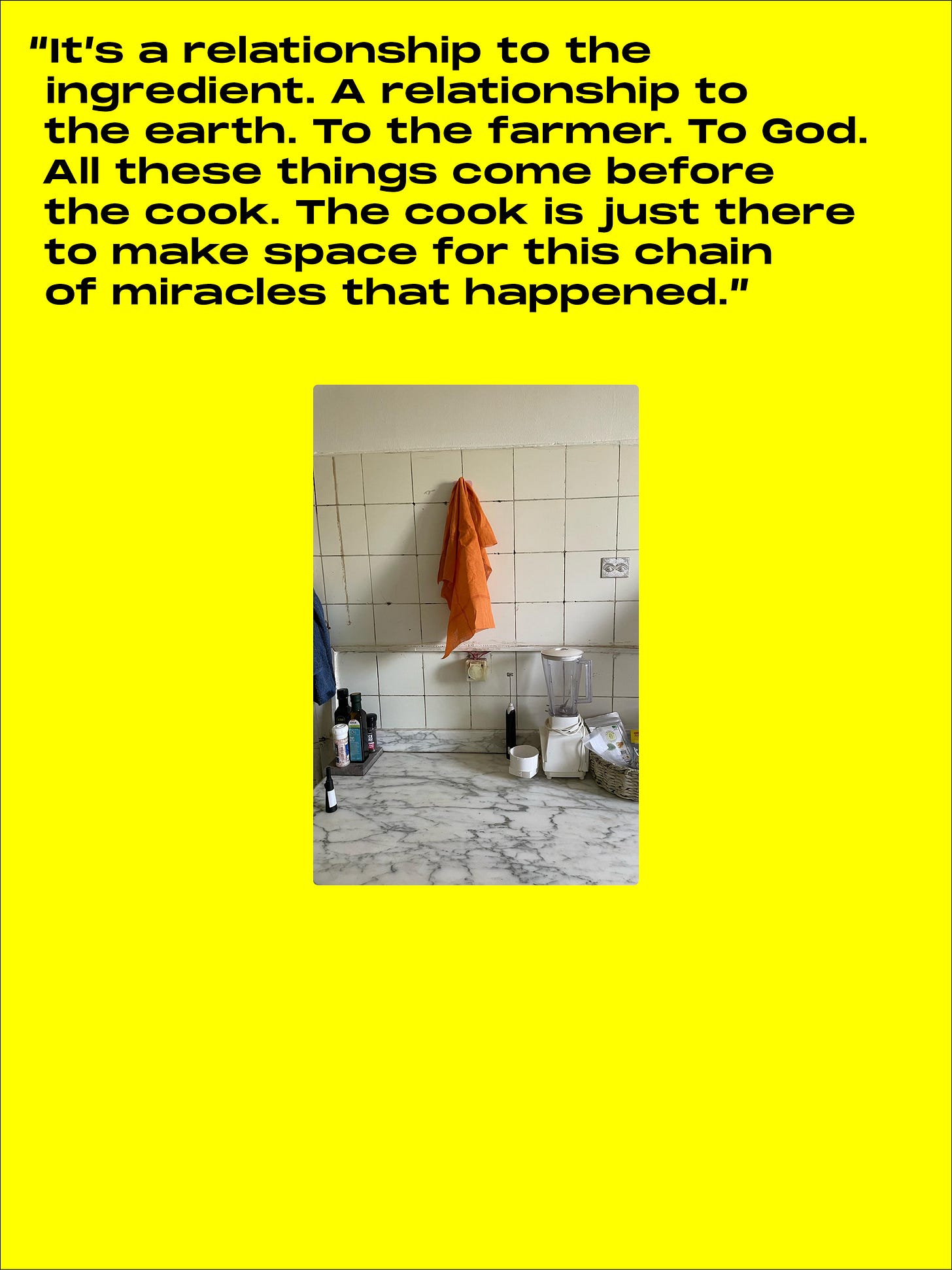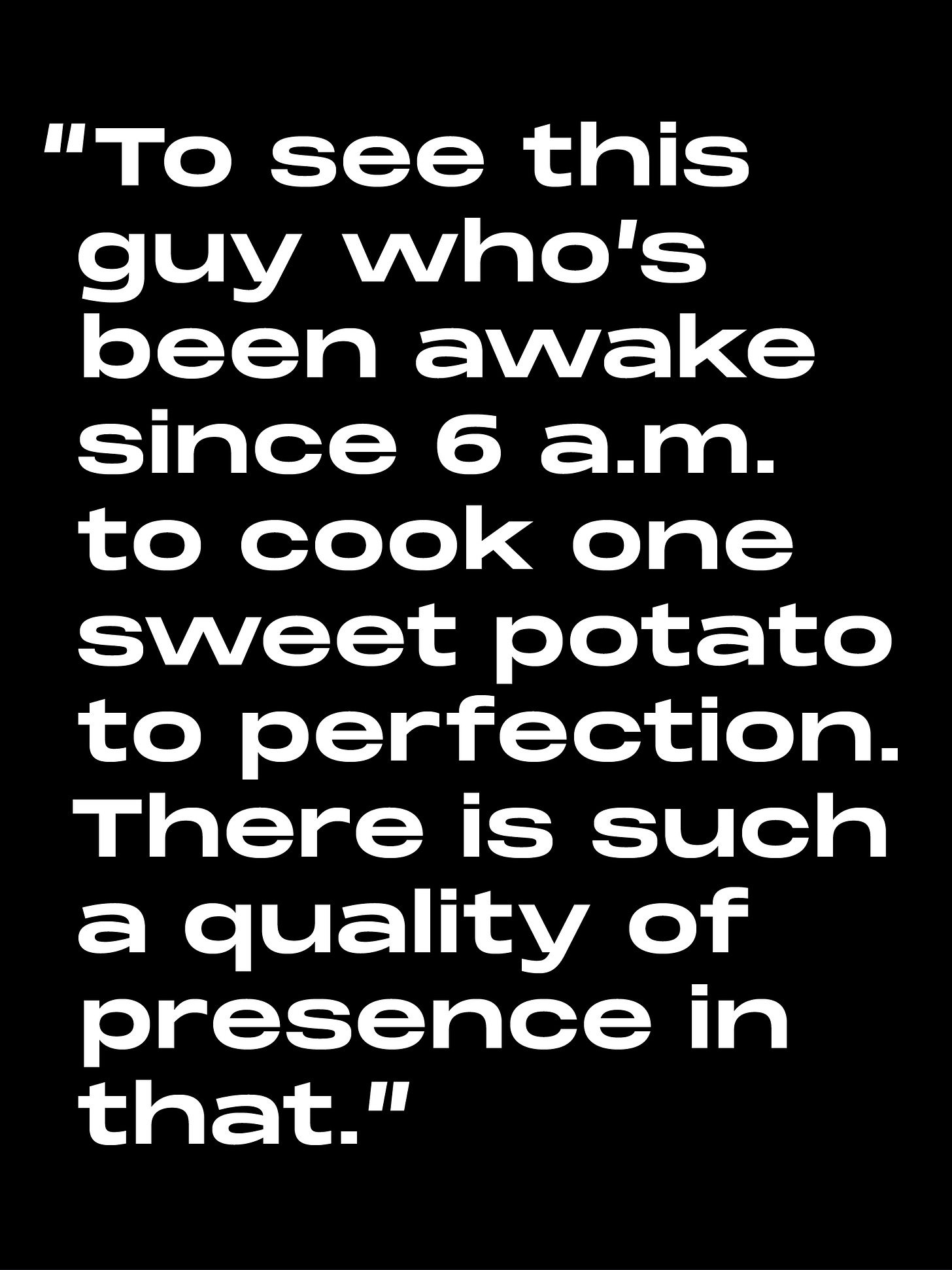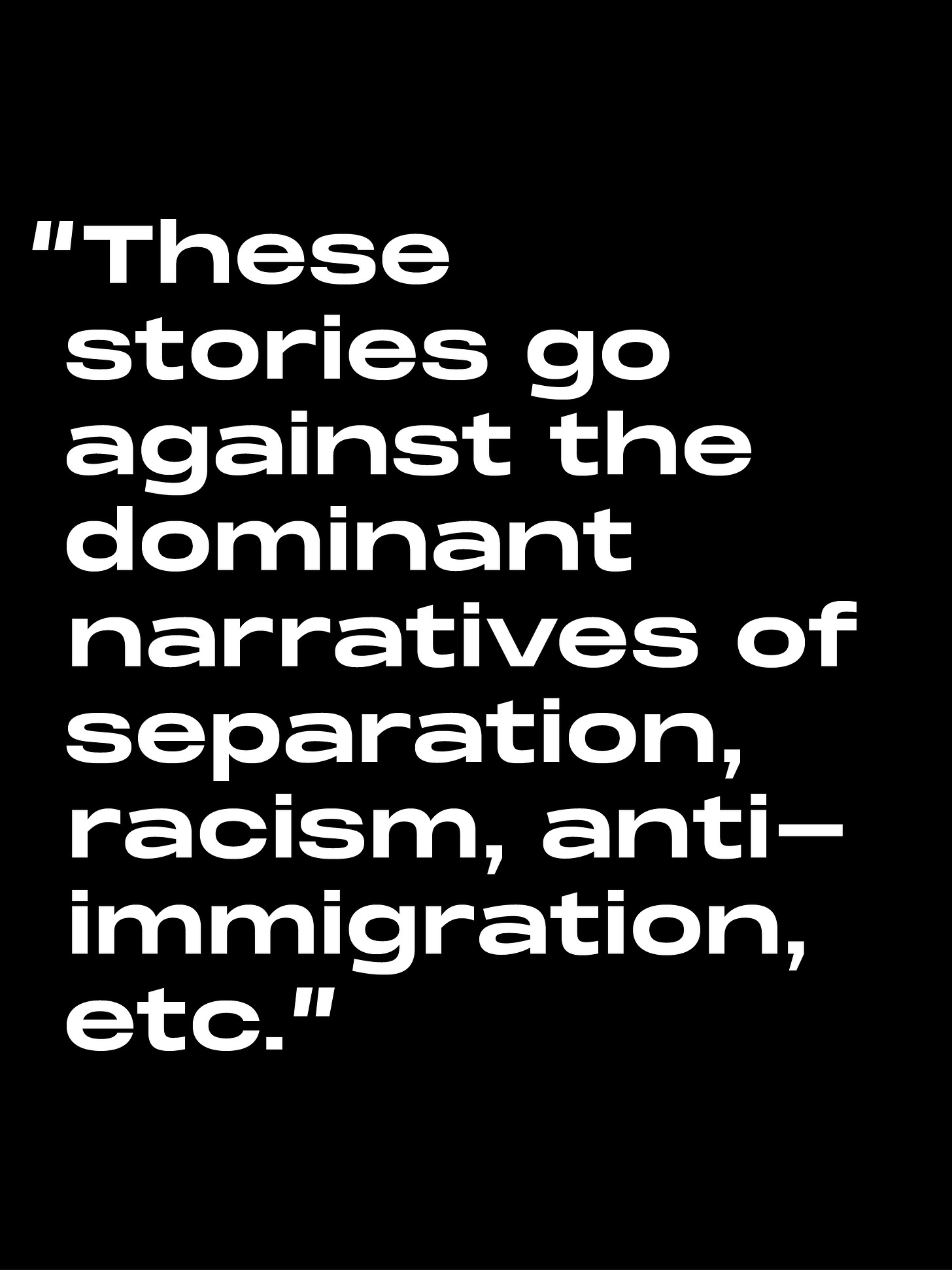KUKII (fka Lafawndah)
Egyptian aunts turned icons, the hallucinatory possibilities of food, a chain of miracles, and how to cook like an arrow.
KUKII (fka Lafawndah), also known as Yasmine Dubois-Zai, is an artist and musician of Egyptian and Iranian descent. Her new E.P., Rare Baby, is a dense, world-sized dew-drop of beauty smashing the windshield of a Cairo taxi. A perfect universe of ideas refracted through a dusty and imperfect reality. We spoke at the end of Ramadan about shedding names to download new versions of ourselves, the crystalization of KUKII, Egyptian aunts turned icons, the hallucinatory possibilities of food, a chain of miracles, and how to cook like an arrow.
Photo: Mohamed Sherif (@mohhamed_sherif)
SUD: Salaam alaikum.
K: Waleykum a salaam.
SUD: How are you this morning?
K: I had a really strange night and no sleep, so I don't feel great. But it's okay. I already feel anxious about the end of Ramadan. I don't want it to end at all.
SUD: I want a coffee. Small things like that. But I never want it to actually end. It's such a strange rhythm. The whole day feels so long, then it's iftar and it all speeds up and I'm going back to sleep. Then I'm waking up again. It’s such a different rhythm. Certain things get so concentrated in specific parts of the day.
K: Yeah, it stretches time. In Cairo it feels like we have many days, many lives. People essentially don't sleep here ever already and then during Ramadan it's like… Last night I heard kids playing by my window at 6 a.m. which makes no sense. You hear these sounds in the middle of the afternoon when kids come out of school and it's been going on from midnight to 6 a.m. and they just haven't gone to sleep. It creates this haze in terms of linear time. But I love it here for that, because it's really experienced collectively, this lack of linear time. Because in other places I can say that all I want but everything around me is like meetings, deadlines, etc. Cairo is the only place on earth, that I've experienced, where time is actually not linear. People will be texting for work stuff at 2 a.m., or friends about something they want to do tomorrow. You don't really do that in Europe, there’s a time frame you’re supposed to communicate in.
SUD: Also this liminal space gets created from lack of sleep, especially during Ramadan. Like if you're on your deen, getting up for tahajjud and fajr every morning, you're always up. In that in between space. But in Western thinking sleep is such a regimented requirement for your health so I wonder to what level that's true. Because they say at least 6 hours, right? Anything less is minutes off your life and a higher chance of dementia as you get older. But consider the lives of so many other parts of the world, where people are up all the time, and can we just make up for it with naps?
K: That's what I do at the moment. I sleep by little hour increments, but I don't really sleep other than that. A lot of people’s spiritual practice is running on 3-4 hours of sleep all year long not just during Ramadan. Like someone told me Jesus was running on like 3 hours of sleep a night (laughing). But there is something in many different spiritual traditions, not only Muslims or Christians, where the absence of sleep creates this liminal space, like you said. I only first experienced it last year when I was here in summer. I stopped eating and sleeping and it just naturally happened. I just couldn't eat solid food. It wouldn't happen. And sleep was maybe 2, 3 hours a day. And that was when I had this big spiritual push. I got really close to God in that time, in a way I never experienced before. A full-on download. Like superpowers essentially. Ramadan is made for that. This is how I understand it. Remove these things and make space for something radical to happen.
SUD: That half awake / half asleep place is super rich with thoughts and ideas that I would never consciously connect. It all drifts into this extra sensory experience that feels collective. Like a whole city all experiencing that on some level is a lot of energy popping at once, you know? When you consider how the Qur’an was downloaded, how fasting and depravation of sleep was a huge part of that, then each of us having that experience through Ramadan, makes you understand and empathize with how that is possible. Breaking down this whole ego self and becoming passive from exhaustion, but your brain is still active because you've had to wake up your body in some way. Sitting in that particular zone every day expands your perception of everything.
K: I'm completely unable to get work done at the moment in a classic sense. Like I can do phone meetings, but sitting in front of my computer to prepare the release of the record…I'm really heavily procrastinating on that shit. I do not want to do wordly stuff. Which is bad timing in a way. But then even if I seem passive from one angle, I'm still waking up to pray, taking these little naps, and living in this in-between state of consciousness where so much is happening to me. Like a thousand new ideas, projects, things coming up under the surface, sorting out some ancestral nods that have never happened ever in my life (laughing). So it's really eventful, but on a very specific frequency.
SUD: This weird, pure feeling can be way more hallucinatory.
K: It is.
SUD: You changed your name. At this stage in your life how would you describe yourself?
K: I try not to, to be honest (laughing). But I'm asked to do it very often and I don't like it too much.
SUD: So you would prefer to avoid descriptors of any kind?
K: Yeah. Because they make it sound like things are put together or consciously decided, and they're just not. It's not my reality. Like the name change is such an insane story that's unfolding before my eyes since Ramadan. I have no words yet to describe what's happening to me. Basically I took the name of my aunt that I knew nothing about. I knew she existed and that was all I knew about my family in Egypt. The name of this one person. And what I knew is she loved me very much and had a picture of me in her house when I was a baby. We only met when I came to Cairo when I was two years old. That's all I knew. I never saw photos. I never heard stories. I knew nothing until very recently about my family here. But when I was coming to Cairo to make music, I had a folder for all the files and I named it “Cairo Kukii”. She became this muse I would fantasize about. Walking down the streets of Cairo and thinking “maybe that's my aunt” or “maybe that's my aunt”. She was this siren back to the city for me.
Then last year I met my dad and he started telling me about her. And I find out she's a full-on icon, like, full-on. Married to the biggest Japanese Egyptologist. Has Japanese-Egyptian babies. Has made all these really strong life choices, but I still don't meet her. I just hear these stories. Around this time it becomes very obvious this is the name. I didn't fully know why, but it was a certitude that it's the name and all I know is that she's also dying. So I meet her for the first time, last week. And she tells me all these psychic stories that she had about me, even though we only met once. Like for decades she was dreaming about me regularly, telling my dad all the time: you have to go find her. Imagining how I look, what kind of person I would be. She felt really, really, really connected karmically to me, on a soul to soul thing, and this is something that I also felt from this name. So this is the stuff I'm thinking about and then people are like “Why did you change your name?” And like “What does it mean?” And I'm like “I don't know”. I really don't. You're asked to answer these things, but it takes the intuitiveness and the divine away to describe things as if they’re my choice.
SUD: They’re impossible things to answer definitively. You still have to fulfill the will of what initiated the change. It’s going to take years to figure out and maybe never be figured out. Maybe the meaning will just be your presence in the name. Do you know the book Leo Africanus by Amin Maalouf? The main character changes his name over and over because he's constantly being pushed from one place to another. And in his interior monologue he's always discussing how he's transforming and understanding more of who he actually is. Shedding names, shedding things to become another version of himself. But he feels closer to who he really is through this process. It made me think of how RZA of Wu Tang Clan names the children born into his extended family. His siblings, cousins, etc. come to him to name their children. And this name-giving is something deeply rooted in his own spirituality so the coming generations of his family have a larger width for what their potential can be. Which is beautiful. In the Wu-Tang documentary, ODB's wife talks about how he had given her this name, and how he would break down the meaning for her to memorize it and she was recounting the story with such tears. Just crying about how much this transformed her life, to suddenly have such a deep meaning attached to her, and understand the details of it. It’s really interesting to reconnect with ancestral histories to understand who we are and question what a name really means to our families, because no one ever really asks what it means for us. If we want it to be something else, if we want to leave it behind. So seeing that happen for you felt exciting to understand that a whole other world is opening for you and then to see what comes from it.
K: It's hard to explain what makes it necessary. It's not rational. Names are also containers. They carry your whole world. And there are times where that world is not correct anymore. It’s strange that people don't change them more often. That people don't feel like they outgrow their container.
SUD: During that Leo Africanus era of the Mediterranean it was a common thing. A rite of transformation to change your name at different stages of personal evolution, but also being forced to do it for survival due to the Inquisition, etc. Until you eventually leave it all and then what is a name?
SUD: What's your earliest memory of food?
K: I was mad at food when I was a child. They say refusing food is the only means that a child has to protest. Until I was maybe six or seven it was my way to let people know if I didn't agree with something. One of my earliest memories was this pizza place in Tehran next to my grandparents house. Being in that restaurant with my cousins, getting fed by our moms, running around and coming back for bites of food. But I was pretending to eat the pizza, and then spitting it out. When we left the restaurant they discovered a little stack of unchewed pizza that I left at the door of the restaurant. That’s my first food memory. But I mean… look how things come around. It's kind of crazy.
SUD: Now you're making up for all the food you protested against?
K: Definitely. I think whether it’s not wanting it or wanting it too much, there's something extremely charged. For me it's very emotional whether I'm not eating at all or eating. It's (laughing) not a chill relationship. But beautiful nonetheless, and curious.
SUD: Where you are changes your relationship to food also. When I moved from New York to London and then when I moved from London to to Napoli my attitudes towards food shifted very unintentionally. The place, what's available, other people's habits, they can all disrupt your rhythm or put you on a totally different one. But coming to Napoli, the way people eat here, is very specific. Everything is really oriented around what's in season. So you really eat the same thing for weeks...
K: Does it get reinvented?
SUD: In ways but not in a psycho way. Everybody feels a responsibility to honor the ingredient by doing the least to disguise it. So it's more a matter of techniques that people use that are simple but brilliant. People really know what certain things need and don't go beyond that. There will be little hacks for how somebody will do something slightly differently and that's what they'll be proud of. But generally, like at the moment for example, I'm going to eat artichokes four times a week and even though I’ll have less lust for them, but I’ll still appreciate them deeply. And so, for me, that was something that really changed my view of food. It became less desire-based. Growing up in New York, everything is New York-ified, so whatever cuisine comes there, and goes through the whole system, it comes out the other side as a cracked-out version, with the flavor turnt up. Maximum.
K: It's super high-reward food all the time. It's crack. All this sugar. It's like catering to a five year old at McDonald's all the time, no matter what kind of food you eat. It's all very high-reward which is a problem. A healthy relationship with food can't be that as the default setting.
SUD: Were you born in Tehran?
K: No, I was born in France, but we moved there when I was two. And then came back to France when I was six.
SUD: Who would you say raised you?
K: My grandparents and my mom in those early years. And then the formative years, I would say my grandparents, their friends, my uncle and aunt. It was a very communal childhood. Very, very decentralized. I remember feeling not great about the sort of atomized mom and dad suburban lifestyle of France. I was confused by that. It didn't feel great.
SUD: In that collective sense, how did they show love?
K: So much attention, so much knowledge shared, so much time spent, so many adventures together. Traveling and going in nature. My grandparents were highly social in a very arts oriented crowd. All their friends were poets and filmmakers and musicians and I was always around. My mom says I was the only child there, so a lot of my memories are hanging out with adults more than children.
SUD: What did your grandparents do?
K: My grandfather was a judge. Very high up. A very strange position. He was the judge of the royal family, which means that he was supposed to keep them in check. Like from the people's side. My grandmother was first a midwife, then she became sort of high up in education. She created the university's programs essentially. And then later was the cultural attache for the American embassy.
SUD: What were their interests that pulled artists and filmmakers and poets close to them?
K: Very intellectual. They loved the arts. They also had an immense sense of humor. Maybe artists are better at that. And they had this thing that was life changing for all of us, that my grandmother learned when she studied in the UK in the 1950s, like some Victorian tradition or something. They would hold an open house every Tuesday for 50 years. Meaning every Tuesday from 4 p.m. the house was open and there was no invitation needed. Whoever wanted to show up was welcome and they kept that open Tuesday all their lives. Whether they were sick, or it rained, or there was the revolution, or the war. It created this community of people. Sometimes there would be a hundred people and sometimes there would be two. But a lot of things were done and said on all levels. Sometimes very intimate and had to do with the matters of the heart, but also a lot of exchanges about art forms. Like the biggest poets of their generation were at our house every Tuesday. They would write things and try it out for feedback. A lot of collaborative, critical thinking was happening. I owe it all to them because this is what I was around before I could speak, which is crazy. Like the first time I spoke was my grandmother's best friend's poem, when I was like three, you know? That's what I mean by adult shit (laughing). It was like straight to that level.
SUD: I would imagine food and beverages were a huge part of bringing people together.
K: It would kind of organize itself. We would provide sweets and fruits and no one ever came empty handed so it created these big unplanned communal meals. But on the other hand, it wasn’t central. My grandmother was not a normal grandmother. She would cook but she never loved it to be honest. So I don't have cooking stories about my grandmother. She was interested in other stuff than the kitchen.
SUD: I like how food can function as an activator. Where it's not about stuffing people with food or the traditional concept of the matriarch in the kitchen, etc. I love having people over to my house to work on something and making tea and coffee, having fruit and sweets. Using these things to facilitate things to happen instead of just sit down, be fed, be served. I love these micro climates of Mediterranean culture where there's always some unique ingredient that specific cultural pockets gather around and it becomes an excuse to get together.
K: Definitely. What I remember for sure from those Tuesdays was the samovar being central. Which is how you make tea in Iran. Everyone has a samovar at home with this concentrated black tea, like essential oil version of black tea, on top and the big part on the bottom with hot water. I was in charge of this when I was a teenager. I would pour the concentrated black tea into little cups and add a little bit of water. I would get yelled at until I got it right because there’s a very specific art to how strong it needed to be. That was a very important ritual for sure. A diluted tea was impolite, like offensive. It had to be black, very black, but never to the point where it's bitter. You had to hit a very specific color to know that it was strong enough, but not bitter.
SUD: In Napoli there's this tradition with hot coffee. It's an insult if a coffee cup is not burning your face off. The cups simmer in these baths of boiling water constantly, waiting for you to order. Then the cup gets blasted under the hot steam, then the shot gets pulled. So you have to wait for the cup to cool down before your lips can touch it. I don't really know the logic, but the visceral experience of drinking the coffee, it really elevates it. You really pay attention because you're burning yourself if you drink it too soon. But I think it has to open your taste buds or something, to taste the coffee even more. That's my theory (laughing). But I need coffee or tea like this now. It needs to be hot. It's like everything here though. This visceral idea of everything. Food HAS to be like THIS, it can't be anything less. It can't be below the standard. And the standard for coffee is super fucking hot everywhere. The best places pride themselves on it. It also gives you this energy boost. Your eyes pop open. Tourists have panic attacks drinking coffee here.
K: The Persian tea high is a very serious one. It's very special to be drinking that black tea because it's like nothing else. It's not like coffee at all. It's a different high.
SUD: How has your philosophy of eating shifted over the years? What fundamental tastes and things do you really appreciate now?
K: I want things to be extremely defined. High-definition food. I want food to be an arrow. The mix of it can be new, or the textures can be intriguing, or the spicing, but I like to know distinctly what the ingredients are. I don't like ambiguous, saucy things, or messy in terms of the distinction of what's on the plate. I like the sashimi version of everything.
SUD: In the sense of pure, raw...
K: Yes, yes, yes. That's how I've moved through my tastes and slowly ended up where I'm at now.
SUD: Was there a trigger for that?
K: Maybe years in New York maybe, or L.A. Where there's this vagueness in food that can happen there. This high-reward seasoning that I felt disgusted by eventually. And just wanting to see through all the bullshit of this fake healthy food. I hate fake healthy food. I think the philosophy around food in western centers is having a weird moment. Paris, London, New York, L.A.; all these places have adopted such a strange relationship to food. This "food culture" that made food fussy or something. People say I'm difficult with food but I think they assume I like fancy stuff, but I really, really don't. I like auntie food. I want food to be simple, straight to the point. And not fussy. Not pretentious. My favorite restaurants in the world are some grandma or some auntie doing the same thing since forever and being the best at it and doing it with a lot of intentionality. Even if she has a restaurant, it’s existed outside of the food capitalism of the moment in time we're in right now. These are my favorite places all over the world.
SUD: Understanding HOW to cook rather than having a “recipe”. When people know how to cook an artichoke, or what to do with a lemon, it's like, that's ALL. That's enough. I love speaking to people selling at the market, asking them what to do with it, because they will always have the most simple way. Because in their mind it's already delicious. They're already selling you something that's beautiful. There's a fruit in Napoli called "baba", which is a normal persimmons, but it's when the persimmons goes super, super ripe and turns brown. It becomes this wet bag of sugary liquid. The guy was like “just squeeze lemon on it”. Like don’t fuck this up (laughing). And it's the most delicious dessert I've ever had in my life. And you take one and squeeze lemon on it. That’s it. The knowledge that comes from people who don't have to impress anyone because they know what they're selling. It needs this. Basta.
K: It's a relationship to the ingredient. A relationship to the earth. To the farmer. To God. All these things come before the cook. The cook is just there to make space for this chain of miracles that happened. Before there was nothing and now there's this thing on your plate. Amplifying it, letting it just be there to exude from itself, that kind of relationship to food is my favorite. It doesn't need intervention. You just need to know the ingredient really well and have a relationship with it and trust that it is in itself perfection (laughing), which it is.
SUD: I'm smiling so much right now. That's really the manifesto of how to eat. It's a blessing to be in Napoli and have access to all these things that grow in this incredible volcanic farmland that's everywhere. It's made me able to taste again in a way, because I think I got fried on this umami crack seasoning for too long.
K: One of the most psychedelic meals that I've had, well there's two, were obviously both Japanese. One was this Japanese mountain food place in L.A. and they didn’t use salt. We ate some broth and vegetables and I was tripping my ass off after this meal. Not out of pleasure. It wasn't like mmmmmmmm. It was something else. Something I had never experienced before. It was...I don't know how to explain it. A high, but not an umami high. A high that comes with silence or neutrality or something. It was a lot of joy and colors and textures. But I was tripping the whole day. It was really wonderful. And then the other meal I had in Japan. This guy who works with all these farmers around Tokyo and makes his own vessels. His restaurants are only vegetables, cooked for eight or 9 hours on a fire that day. A tiny bit of salt on the plate. A tiny, tiny, tiny bit of some prune thing, not even enough for you to dip it. And it was the same. One of the most psychedelic meals I've ever had. Just four or five vegetables on a plate, cooked to absolute perfection. And that's his thing. His role is to be at the end of the chain of all these miracles that have happened. It is his responsibility to cook to perfection. But you’re just eating a sweet potato with barely any salt, because the point is to not hide the taste. It's very ceremonial. You get one vegetable after the other. The quality of presence when food is an arrow. Looking at this sweet potato and thinking the whole life of it that made it possible for me to eat it. And then to see this guy who's been awake since 6 a.m. to cook one sweet potato to perfection. There is such a quality of presence in that and I wish I could eat like this only.
It comes back to what moves me the most during Ramadan. When you eat once a day, there is so much intentionality around this meal. Who am I going to eat with? What am I going to eat? Where are we going to be? The ultimate relationship to food is to have that level of presence and care. This guy is responsible for this sweet potato now and he has a relationship with the guy who grows it and knows the whole story. He goes to his farm that week to get it and he knows what it took for the farmer to grow it. And what it took for the Earth to bring it to the farmer. The chain of miracles. Once I discovered this whole way of eating, or philosophy, it's been life changing.
SUD: This is the spirit of of Sudhalal. To connect that kind of process, to create a sensory psychedelia around the food of the Mediterranean. Because all of these things are here. It’s a matter of being able to step forward from tradition, keep it intact and connected, but allow it to be taken apart and put back together in ways that we're able to have more presence within it, and the experience of it. It's not about elevating anything at all, it's the opposite of that. It's about giving people more room to breathe and taste, understand what things are, where they come from, and have more awareness of that. But it goes back to realizing that a lot of globalized food culture is a scam. That everything is an illusion. What you’re describing in Japan is the total opposite of that. It's getting to the essence, the reality, the truth of it. I think part of why the Mediterranean doesn't function like this more widely is because it's been treated as a dividing line. A border between places instead of a unifying well of knowledge and nutrition and beauty and cooking and stories. All that needs to be shared on both sides of it. There's more in common between Southern Europe, North Africa and the Levant than there is between Northern Europe.
K: Oh my god yes. Definitely. It's my kink in terms of food anthropology. To see how things move through time and space and understand the history of connectedness through food. To follow the movements of ingredients and food traditions and understand how they were transformed through the movement of humans. These stories go against the dominant narratives of separation, racism, anti-immigration, etc. You understand how everything is connected through the things that people share and how they transform and create another life for this thing that arrived to them differently. I love that shit. My passion in life is to follow food stories. I feel like they say the most.
SUD: The Mediterranean’s existence offers this decolonial aspect of food history. The way things traveled from as far as China through trade routes to get to the Mediterranean over thousands of years is so deeply enmeshed in what Mediterranean cuisine and cooking is. Because all of these things arrived from so many different people and places and ways and all had a stamp put on them as they traveled through their hands. It's interesting to consider al-Andalus and that particular era for how all of this collided in an openness to so many different cultures and a deep interest in understanding them. How that wasn't based in a curiosity that was othering or fetishizing. It was about sharing food as part of a larger faith in being Muslim, through ideas that come from the oneness of Tawhid. And celebrating how people reflect that oneness in different ways. That reality is something that's not present at all in current versions of European history.
SUD: So in the sense of halal, how do you engage with it? How do you think about?
K: I don't know. I'm not well versed in it. I think the moment we're in right now in terms of the halal industry, it is only solving something on the surface. I've had this conversation many times with friends, like we always say we prefer to eat less meat. We prefer to buy meat from sources we know and understand the process was done in a respectful way, even if it's not necessarily done in an Islamic way. Because a lot of the halal butchers in Paris are shit.
SUD: There's a culture in America that's become super motivated to connect organic to halal. And there's a lot of farms that are specifically in New York selling at the farmers market, but also doing everything from vegetables, to meat, to eggs. And what seems to be slowing that down in Europe has a lot to do with restrictions on how animals can be slaughtered because of a misperception that the electrocution and bolt gun method of industrial slaughter is the most humane. So a lot of halal meat is sourced from outside of Europe. But many younger Muslims would like to make these shifts. Make this update to halal.
K: I feel like this needs to happen with food, but I also feel like this about religion as a whole. Choosing one thing, picking it apart, decontextualizing it, rethinking the things that are the most digestible on the surface. There is some responsibility for the ones that join later in life to do this. No one told us essentially to be where we're at. I think that gives a lot of freedom to search and study in a way that doesn’t come when you’ve been told how to have a relationship with God from childhood. But there is a path that each of us fulfills in our own way. There are new sets of eyes on what religions are actually saying and how they can be applied today.
SUD: Mohamed Abdou's book, Islam and Anarchism, talks about this. About the larger responsibility to interrogate. That the Qur’an requires you as an individual to use your rational mind to understand what it is saying. And it's specifically not about taking other people's interpretation as law, because that's their own perspective. This is the beauty of Islam being open to people to join, opening the door for other and newer interpretations that are less dogmatic to the past. A lot of people welcome that quite a bit. This responsibility to unravel the perceptions you arrive with and allow things to take their own shape. To find a new way to the other side.
SUD: I know you moved into a new place. What are you actually doing for food? What are you cooking?
K: There's not a great variety of ingredients here. I'm trying to figure out the story, what was here before, but at the moment it feels very monoculture. So I'm just enjoying eating. I'm pretty much eating the same thing every day for suhoor. Iftar I'm 90% of the time with people's families. Iftar is always soup first, then a salad and then just fuck loads of rice and meat and sambousek, these little triangles with cheese inside. Also vine leaves stuffed with rice and aubergine, layered with tomatoes and meat. A lot of molokhia, an Egyptian leaf that's eaten like a soup poured over your rice, which is what I make if I'm alone. My diet in Cairo is really simple. There's something very beautiful about bread and eggs. I got my olive oil plug sorted after I visited Siwa, this oasis next to Libya, where we have friends with a farm in the desert. The olive oil comes from their neighbor who has an olive grove in the desert. The most beautiful olive oil. I found this crazy seed bank here that has been keeping seeds for hundreds of years. We want to visit them as a project and see if we can learn about what else can grow here. Because it can’t just be aubergine and tomatoes and fucking peppers. Like what was here before, before, before? I want to understand what ingredients can grow here in the middle of the desert, you know? I also want to start a medicinal plant garden on my friend's farm. There's this woman, like a good witch, who lives in the St. Catherine Mountain on Sinai, close to where Moses was hanging out with God. A very old herbalist witch who knows about all the plants that grow on the mountain, which is a very sacred place. So I want to visit her and see if she can give us some seeds for the garden.
* Recipes posted to our recipe section on Fridays.





